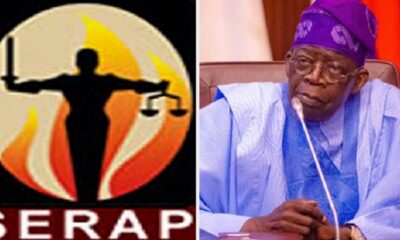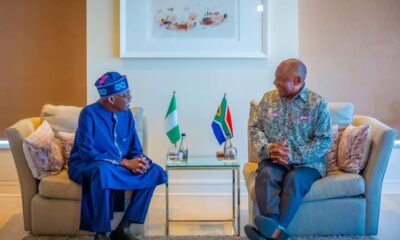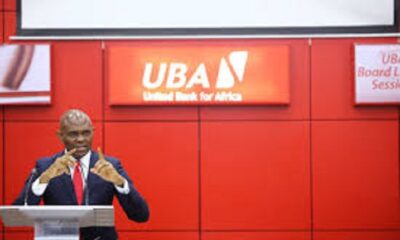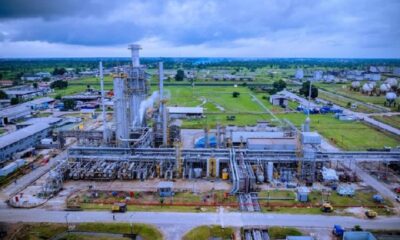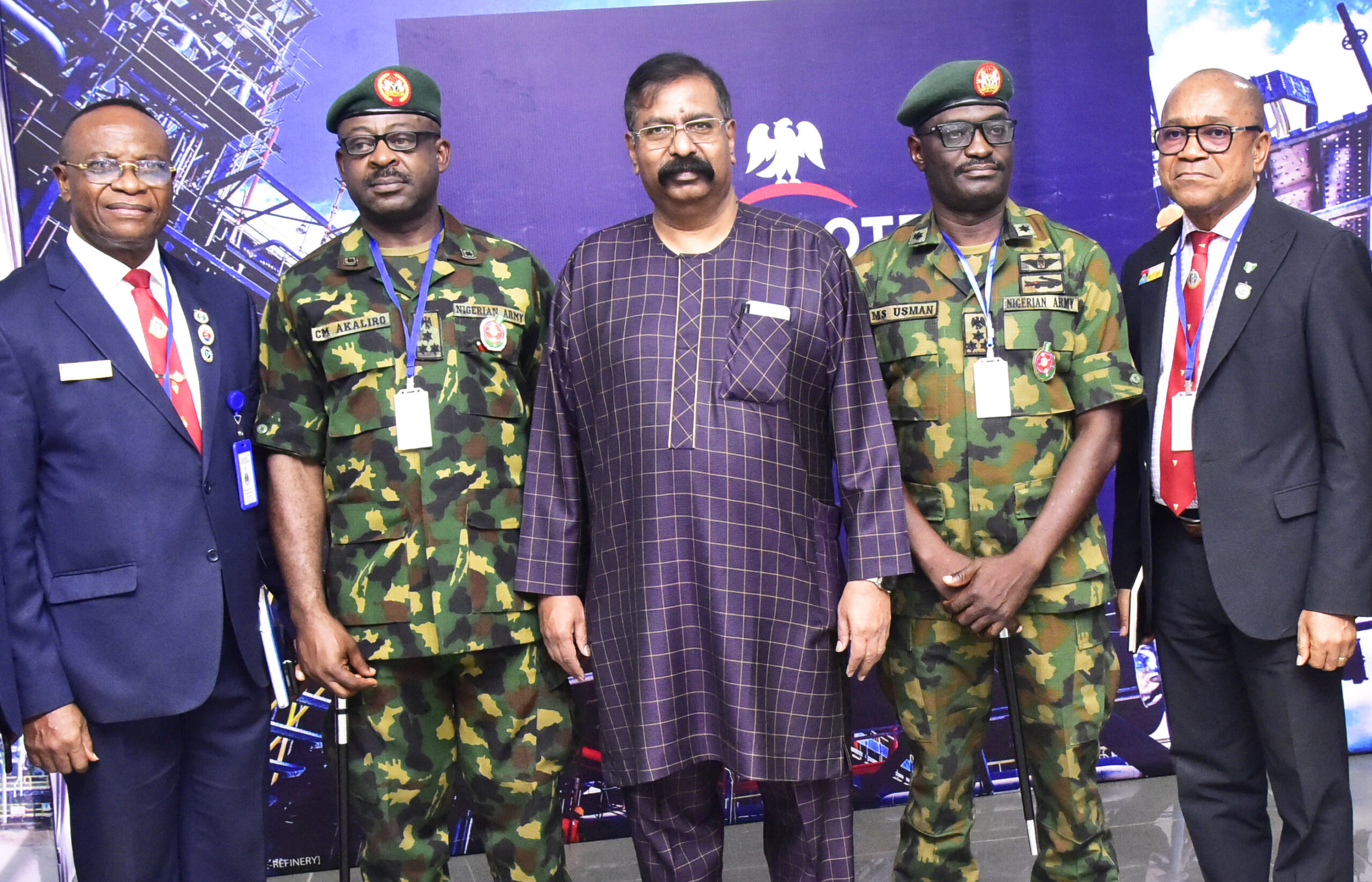NEWS
BREAKING: Presidency Urges Atiku To End Grand Illusions, Fantasies
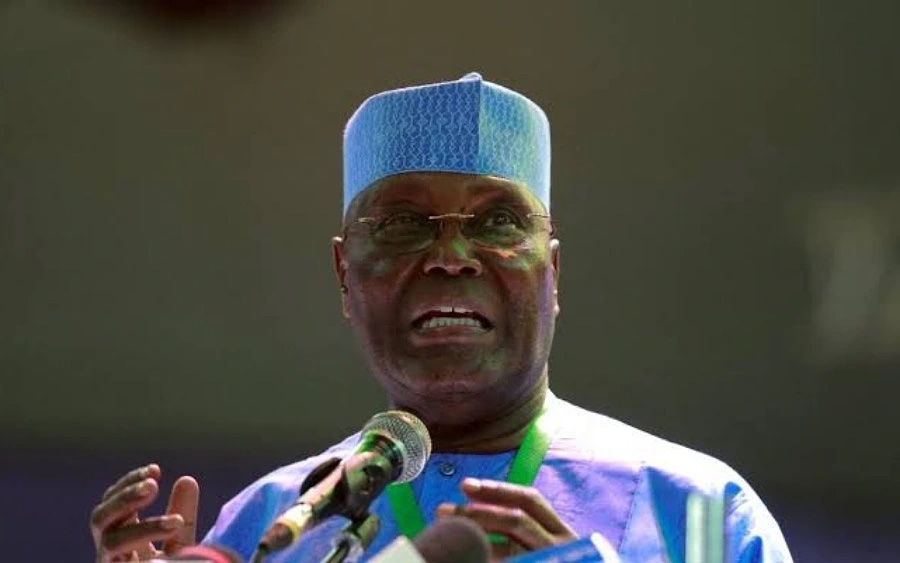
The political warfare between the ruling All Progressives Congress (APC) and the Peoples Democratic Party (PDP) gained momentum with increased firepower from the Presidency on Sunday.
The Special Adviser to the President, Information & Strategy, Bayo Onanuga, fired the salvo in a statehouse statement in Abuja, on Sunday.
According to the statement, issued under the subject ‘time for Atiku Abubakar to end his grand illusions and fantasies,’ the “former Vice President Atiku Abubakar has shown more interest in undermining President Bola Ahmed Tinubu than in addressing his party’s implosion”.
He declared “We can only urge him to purge himself of the petty, derisive politics of a sore loser.”
ALSO READ: Atiku Congratulates Trump, Calls For Support For Free, Fair Elections In Nigeria
Political pundits are of the view that the hot exchange between the gladiators is setting the tone for Nigeria’s 2027 presidential election.
Onanuga wrote, “Since his defeat in the last election, former Vice President Atiku Abubakar has shown more interest in undermining President Bola Ahmed Tinubu than in addressing his party’s implosion. We suspect he is envious of Tinubu’s position — an office he has unsuccessfully sought six times.
“It is perplexing that he would elevate his untested, hypothetical proposal, which Nigerians soundly rejected during the 2023 Presidential Election, and seek to present it as a superior alternative to the multi-faceted reform programmes implemented by the Tinubu administration. If his plan lacked popular appeal, he must acknowledge that merely repackaging it will not resolve the social and economic challenges his People’s Democratic Party (PDP) bequeathed after 16 years in power.
“Atiku’s economic analysis demonstrates a significant misunderstanding of Nigeria’s realities. His narrative, “What We Would Have Done Differently,” indicates an inability to engage with the pressing economic realities being revitalised multidimensionally under President Tinubu’s leadership.
“What reforms would Atiku propose at the onset of his hypothetical and fabled presidency? While he suggests a consultation period upon assuming office, the reality is that the Nigerian economy requires immediate and decisive action. A leader must be prepared to tackle challenges from Day One, as President Tinubu has done.
“Atiku, going further to accuse President Tinubu of “stealing his presidency,” exposed his sense of entitlement and his disconnect from the electorate. The truth is that Tinubu rightfully won the presidency, a position Atiku was simply unqualified for due to his arrogance, insensitivity to Nigeria’s diversity, and the decision to disregard his party’s power rotation arrangement between the North and the South after eight years of President Muhammadu Buhari.
“Atiku’s idea of a consultation period upon entering office shows a troubling lack of awareness regarding the state of the economy, which was in dire need of urgent action. The Tinubu administration came prepared with a firm action plan to address the shortcomings that persisted during President Olusegun Obasanjo’s time when Atiku was vice president.
“We can only speculate what detrimental impact Atiku’s proposed lengthy town hall and Village Square meetings would have had on Nigeria’s economy if he had been elected president and taken such an approach. The country needed a proactive leader such as Tinubu, who immediately set to work on addressing economic challenges rather than one who would have squandered precious time on consultations and a questionable privatisation agenda.
“Atiku’s critiques of Tinubu’s presidency are mere harebrained propositions devoid of realistic alternatives. He must reckon with the decades of mismanaged economy inherited by the current administration, including exorbitant subsidy expenditures far exceeding government earnings from crude oil. As of mid-2023, the landing cost of fuel was between N500 and N600, while it was sold nationwide at an average of N200. The 2023 budget allocated N3.36 trillion for fuel subsidies until June 2023 against a projected N2.23 trillion in oil revenue for the year. The Nigerian state was on life support.
“Instead of conjuring imaginary scenarios, we expect the former vice president to engage with these urgent realities.
“The estimated N5.4 trillion savings from subsidy removal in 2024 are being actively directed toward infrastructure development and social intervention programmes, initiatives that will benefit all tiers of government and enhance Nigerians’ quality of life.
“We expect Atiku to commend what the Tinubu administration has done concerning revenue generation for the Federation. Without factoring in oil sales, revenue proceeds generated by the Federal Inland Revenue Service almost doubled in the first half of 2024, compared with the level Tinubu met in 2023. The states and councils are more prosperous because of it, as many states have increased the minimum wage for their workers to between N70,000 and N85,000.
“Atiku’s proposal to privatise the four government-owned refineries, which collectively can only meet a fraction of the nation’s daily fuel consumption when activated, lacks originality.
“In 2007, investors were only willing to offer $160 million for 51% equity in the Port Harcourt Refinery, while the Kaduna Refinery had an offer of $102 million. According to industry experts and the late President Umar Musa Yar’Adua, Nigeria’s Head of State at the time, who cancelled the sale of the refineries by the Obasanjo-Atiku government, the offered bids were considered scrap value.
“As vice president, Atiku oversaw the sale of the nation’s assets to private individuals and cronies at low prices. Today, most public enterprises Atiku sold have been stripped and become dead assets.
“The model of farming the completely rehabilitated refineries to private sector managers at an agreed-upon rate of return to the government, as adopted by Tinubu’s government, is more practical and value-laden than selling our national patrimony to some private interests that are not technically capable of operating the refineries. The Tinubu administration focuses on revitalising these refineries while supporting modular refineries and the Dangote Refinery, which has greater capacity.
“This approach will guarantee domestic production and stabilise retail prices by reducing foreign exchange challenges. It includes selling crude oil to the refineries in Naira, enabling potential cost reductions that could reflect in retail prices.
“Regarding Atiku’s allegations of corruption within the NNPC, the fuel subsidy has historically been the leading corruption enabler in the state-owned oil company. President Tinubu’s removal of this subsidy eliminated the most significant incentive for corruption within the NNPC. During his eight-year tenure as Vice President, Atiku and his boss had an opportunity to address this issue but failed to make any significant reforms in the oil sector.
“In any case, is it not ironic that an Atiku, who was entangled in corruption allegations, including one in which his wife was indicted and his business associate, former US Congressman William Jefferson, was jailed for 13 years, is now talking about corruption matters?
“The suggestion of phased-out subsidy removal is an outdated approach that has historically led to fiscal challenges for countries like Indonesia, which Atiku references. Nigeria has gradually phased out subsidies since 1978, with numerous adjustments made. Fuel prices were adjusted 22 times between 1978 and 2020. Rather than pushing for unrealistic timelines, Atiku should recognise the necessity of President Tinubu’s bold reforms.
“Notably, while Atiku peddles his economic fantasies, he has yet to denounce President Tinubu’s removal of the fuel subsidy because he knows that the reform was necessary and correct. We can only urge him to purge himself of the petty, derisive politics of a sore loser.
“To alleviate the effect of the fuel subsidy removal on the very poor and vulnerable, the Tinubu administration has embarked on an active social intervention campaign involving cash transfers and the distribution of palliatives. So far, 20 million Nigerians are being targeted for direct cash transfers, an established social protection mechanism described as economically transformative by the World Bank and many development partners. The Tinubu administration has designed well-targeted social inclusion programmes, including student loans, consumer credits, and the Presidential CNG Initiative, all initiated within the first 12 months.
“In his foreign exchange management proposal, Atiku declared that a fixed exchange rate system was out of the question. Yet his managed float proposal, another gradualist approach, is still the same as the old fixed exchange rate system, which stagnated the national economy by subsidising forex up to $1.5 billion monthly to a privileged few.
“Atiku should remember that a managed float is also known as a dirty float because of its inherent flaws. The system combines elements of fixed and floating exchange rates. The CBN will still have to set the exchange rate and make it available to people and businesses. Access is not guaranteed to all, as it is now.
“In conclusion, Atiku’s economic proposals fail to present a viable alternative to Tinubu’s decisive reforms. We encourage him to reassess his approach and repair his reputation as a statesman. The rejection of his proposals in the 2023 election indicates that Nigerians will be reluctant to entertain his future political ambitions.
“President Tinubu remains focused on leading Nigeria toward a prosperous future and addressing our nation’s real challenges. Atiku Abubakar should abandon his politics of distraction and fantasies and focus on constructive discourse.”
NEWS
EFCC Reacts To Sowore, Co-Travellers’ Tantrums On Landmark Recovery
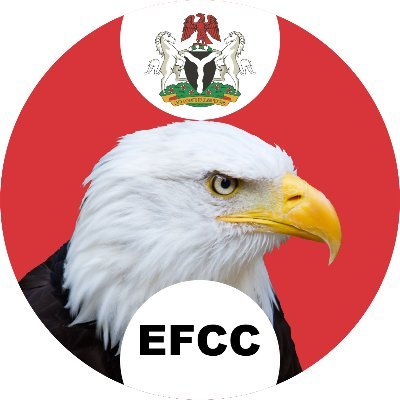
The Economic and Financial Crimes Commission (EFCC), has taken exception to unsavoury assertions by certain prejudiced individuals over the landmark recovery of 753 duplexes.
This was contained in a statement on Tuesday by its Head, Media & Publicity, Dele Oyewale.
While welcoming the thoughts of well meaning Nigerians on the matter, the anti graft agency made it clear that “the denigration of such efforts by Omowole Sowore and his think-same and act-same, is unacceptable and grossly un-charitable.”
ALSO READ:EFCC Makes Single Largest Asset Recovery Till Date
Oyewale stated, “The Economic and Financial Crimes Commission, EFCC, is following with keen interest, the flurry of reactions to its record-breaking recovery of 753 duplexes and other apartments on Plot 109 Cadastral Zone C09, Lokogoma District, Abuja.
“The commentaries of reform-minded Nigerians to the Commission’s painstaking efforts in securing the final forfeiture of the Estate to the Federal Government of Nigeria, are appreciated. However, the denigration of such efforts by Omowole Sowore and his think-same and act-same, is unacceptable and grossly un-charitable.
“The allegation of a cover up of the identity of the promoters of the Estate stands logic on the head in the sense that the proceedings for the forfeiture of the Estate were in line with Section 17 of the Advance Fee Fraud Act which is a civil proceeding that allows for action-in-rem rather than action-in-personam. The latter allows legal actions against a property and not an individual, especially in a situation of an unclaimed property. This Act allows you to take up a forfeiture proceeding against a chattel that is not a juristic person. This is exactly what the Commission did in respect of the Estate.
“The proceedings that yielded the final forfeiture of the Estate were products of actionable intelligence available to the Commission. The company flagged by our investigations denied ownership of the Estate following publications made in leading national newspapers. On the basis of this, the Commission approached the court for an order of final forfeiture which Justice Jude Onwuegbuzie of the Federal Capital Territory, FCT, High Court granted on Monday, December 2, 2024.
“The expectation of the EFCC from citizen Sowore is a patriotic appreciation of its efforts in securing such a landmark forfeiture. It is shocking that the activist is not concerned about the systemic lassitude and unhelpful permissiveness that allowed such a monstrous corrupt act in the first instance. Nigerians should gear up more against lapses and loopholes in our system that continue to make the nation vulnerable to corrupt tendencies. The EFCC will continue to safeguard the financial space of the nation against manipulators and organised brigandage.
“It is important to note that the substantive criminal investigation on the matter still continues. It will be unprofessional of the EFCC to go to town by mentioning names of individuals whose identities were not directly linked to any title document of the properties. The EFCC is unwavering in its no-sacred-cow approach to every matter and together we will make Nigeria greater.”
NEWS
Minimum Wage: Kaduna NLC Suspends Strike For Seven Days
The Kaduna State chapter of the Nigerian Labour Congress (NLC) has suspended its strike over the state government’s failure to fully implement the N72,000 minimum wage for all workers.
The strike, which began on Monday, was halted for seven days following late-night negotiations with government officials.
Speaking to reporters in Kaduna on Tuesday, NLC State Chairman Ayuba Suleiman explained the union’s decision to suspend the industrial action.
READ MORE: Festive Season: Aero Contractors Slashes Ticket Prices To N80,000
He said, “We met with the government representatives and agreed to suspend the strike for seven days to give them space to revisit their payment template. We rejected the payment because it exempted some workers, paid others less, and paid some more. We want a uniform payment template that reflects the new minimum wage.”
Suleiman expressed appreciation to workers for their support during the strike and urged them to resume work immediately.
“We thank you for your compliance, and we assure you that your interests are our priority. You can now return to work tomorrow morning, and we will continue to fight for your rights,” he added.
The NLC chairman also noted that the suspension followed consultations with the National Monitoring Committee, which gave the union the green light to pause the action temporarily.
“We contacted the NLC’s National Monitoring Committee, and they gave us the go-ahead to suspend the strike. We are confident that the state government will revisit its payment template and come up with a uniform payment structure that reflects the new minimum wage,” Suleiman stated.
The strike was triggered by what the union described as inconsistencies in the state government’s salary adjustments, despite an official minimum wage of N72,000.
The NLC insisted that the payment structure must comply with consequential adjustments to ensure equity among all workers.
However, the Kaduna State government has defended its position, clarifying that the dispute is not about the minimum wage but about salary adjustments.
“The least-paid worker in Kaduna state received N72,000 in November,” said Ibraheem Musa, Chief Press Secretary to Governor Uba Sani.
“The issue is not about the minimum wage, but about the consequential adjustments. We urge patience, as the state’s limited revenue, which comprises an average monthly allocation of N8 billion from the Federal Account Allocation Committee (FAAC) and N4 billion in internally generated revenue, makes it difficult to implement the adjustments immediately.”
NEWS
Tax Bills Debate Heats Up: Tinubu Orders Review To Address Concerns
President Bola Tinubu has directed the Federal Ministry of Justice and the National Assembly to address concerns raised over the proposed Tax Reform Bills.
The bills, which aim to reshape Nigeria’s fiscal policies, have faced criticism from various quarters, particularly northern governors who claim the reforms could harm their region.
The reforms have been described by some critics as potentially impoverishing Nigerians and targeting the northern region.
However, the presidency has dismissed these allegations as unfounded.
READ ALSO: FIRS Chairman Advocates For Innovation To Boost Nigeria’s Economy
Minister of Information and National Orientation, Mohammed Idris, assured Nigerians that the government is committed to transparency and fairness.
“The government has nothing sinister to warrant the suggestion that the process is being rushed. In line with the established legislative procedure, the Federal Government welcomes meaningful inputs that can address whatever grey areas there may be in the bills,” Idris said in a statement on Tuesday.
He added that President Tinubu has mandated the Justice Ministry and relevant officials to work closely with the National Assembly to resolve any concerns before the bills are passed into law.
Idris lauded the public engagement on the issue, describing the debates as “commendable” and in line with democratic principles.
“It is very inspiring to see Nigerians from all walks of life coming out to express their views and opinions on these matters of critical national importance.
“In the spirit of democratic engagement, there should be no room for name-calling or the injection of unnecessary ethnic and regional slurs into this important national conversation.”
Addressing allegations that the bills are anti-north, Idris dismissed the claims as “fake news” and “misinformation.” He emphasized that the reforms are designed to benefit all Nigerians and would not marginalize any region.
“These fiscal reforms will not impoverish any state or region of the country, neither will they lead to the scrapping or weakening of any federal agencies,” he said.
The Tax Reform Bills were the focus of a recent town hall event hosted by Channels Television, where experts weighed in on the controversy.
Among the panelists were Taiwo Oyedele, Chairman of the Presidential Fiscal Policy and Tax Reforms Committee; Yakubu Dogara, a former Speaker of the House of Representatives; and Governor Sule Abdullahi of Nasarawa State.
Oyedele defended the bills, highlighting their potential to transform the country’s fiscal system.
“These bills have more than 200 transformative provisions to fix our country and set us on the right path to prosperity,” he said.
“We should not allow one or two provisions that we can easily discuss and agree on to become the pain or the bottleneck.”
Dogara urged critics, particularly from the northern region, to avoid politicizing the issue. “I want to talk to my brothers in the North. I don’t think this is the time for us to begin to condemn the president and to begin to say that on account of these bills, he is anti-north,” he said.
Despite calls for the bills to be withdrawn, the Senate has already passed them through a second reading.
Stakeholders hope that Tinubu’s directive for a review will ensure that all concerns are addressed and the final legislation promotes equitable economic reforms.



